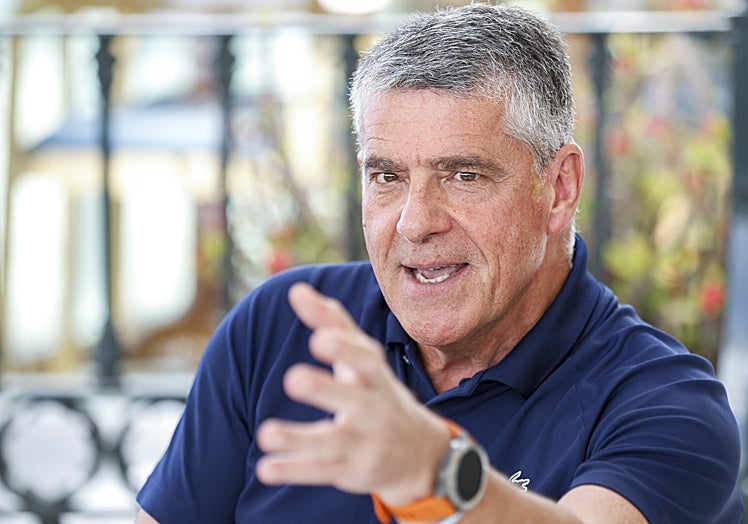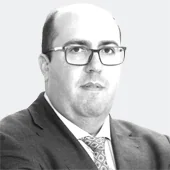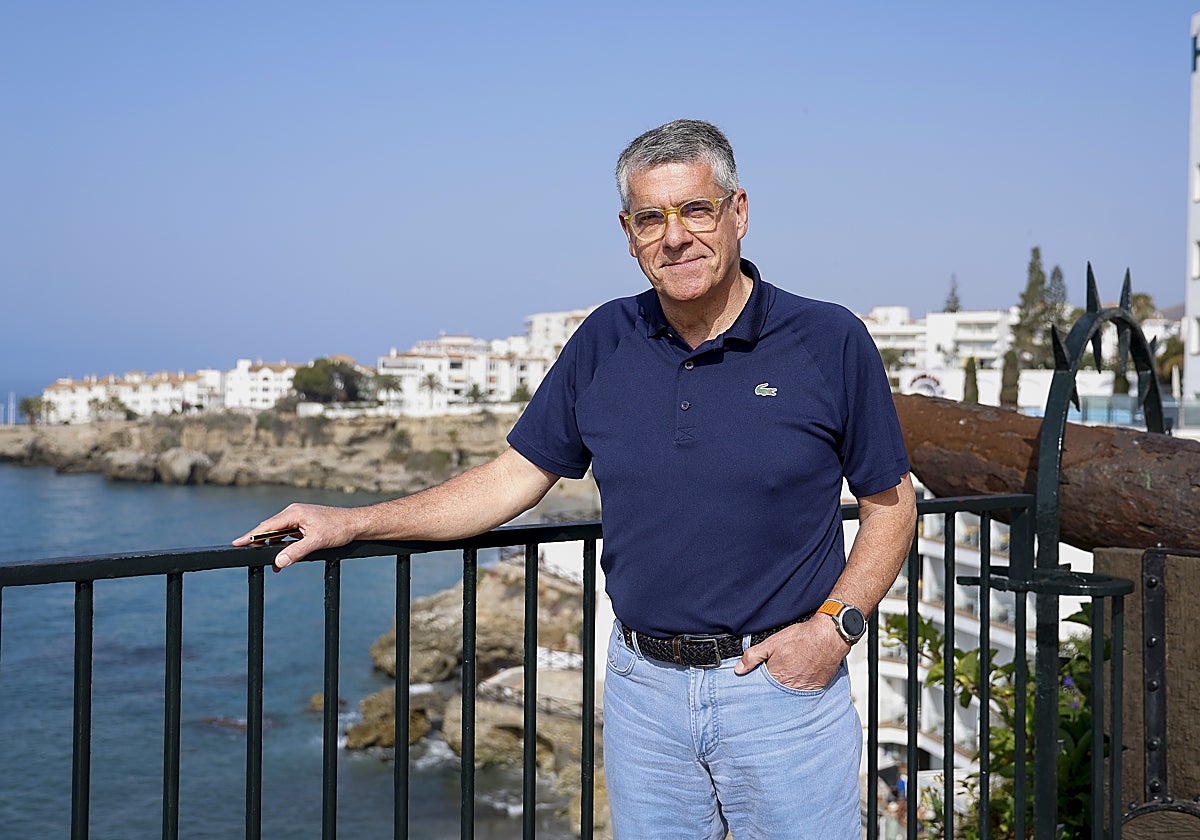Nerja mayor reflects on 30 years in politics
On the occasion of the anniversary, the politician granted SUR an interview at the iconic Balcón de Europa on the Costa del Sol to talk about how the town has changed and the challenges for the future
Tuesday 17 June 2025 marked three decades since José Alberto Armijo Navas - born in 1960 - first became the mayor of Nerja, on the eastern Costa del Sol. It is a position he has held since then except for the 2015-2019 legislature, making him the longest-serving mayor in Malaga province - the longest continuous incumbent is Joaquín Villanova in Alhaurín de la Torre, who took office in 1996. On the occasion of the anniversary, the mayor granted SUR an interview at the town's iconic Balcón de Europa to talk about how Nerja has changed and the challenges for the future.
-How do you remember that first investiture?
-It was a day of great joy and also of concern because of the responsibility I was taking on in facing a municipal government with practically no management experience; although I had been in the opposition for eight years, it was the first time I had governed. I was also aware that it was going to be a complicated government because in order to achieve a majority I had to reach an agreement with the Partido Andalucista and two independent parties. In spite of this, we were able to keep the government practically stable until almost the end of the legislature, and things can't have gone too badly because in 1999 we achieved an absolute majority.
- When you became mayor in 1995, did you ever think you would be mayor for so many years?
-No. Politics was not in my calculations. My idea was to graduate in law and join the Navy's legal corps. In fact, I took the IMEC (Instrucción Militar de Escalas de Complemento) exams, but I had no connections of any kind and I was excluded. Then I started to prepare for the Labour Inspection exams, but for family reasons I had to leave and return to Nerja. Here, together with a friend, I decided to join the party. But under no circumstances could I have imagined that my life would end up being a life of service dedicated to the town hall and the people of Nerja.
On his beginnings: "Politics was not in my calculations. My idea was to finish law school and join the navy's legal corps"
-How has Nerja changed in these three decades?
-It has undergone a profound transformation. If we compare photographs of Nerja in 1995 and today, the change has been extraordinarily significant. Starting from the important premise that in 1995, the town hall was practically bankrupt, with a huge debt with the Social Security, with the Treasury, with suppliers, etc. In these years, with a moderate tax burden compared to town halls with similar budgets, we have managed to get the town hall in good shape and to promote very important projects for Nerja.
- If you had to point out a couple of key actions in this period for the development and expansion of Nerja, what would they be?
-In 1995 we had the focus on three important projects that could contribute to establish Nerja as the tourist capital of the eastern Costa: a sewage treatment plant, a health centre and the marina. Of these, the sewage treatment plant is in operation; the health centre will be operational next year and the marina, which depends on the Junta de Andalucía and the government. This is a project that is not being given the impetus it really needs by both administrations and the Junta and the Directorate General of Coasts should pay attention to it. Along with these projects, 30 years ago Nerja did not have any underground parking spaces and now we have 1,200 and a project that will take us to 2,000. This parking policy has contributed a lot to the economic and touristic development of Nerja. There is also the Villa de Nerja cultural centre, the new library on the Balcón de Europa, we are working on the new Giner de los Ríos cultural building and sports facilities that are a reference at provincial level.

Zoom

-What is the thorn in your side from this period for not having been able to carry it out?
-The marina is the only unfinished business of those I set myself in 1995. I have dedicated time to it and Nerja has been a very vindictive town hall with countless agreements. But I have to recognise that in almost all my time as mayor I have had to face administrations that have not wanted to row in the same direction.
-What are the main challenges facing Nerja today?
-Continuing to improve the provision of services, supporting those projects that have an enormous impact on tourism and above all, three urban developments that are going to be decisive for Nerja as a tourist destination of excellence. They are the Playazo project, with the extension of the promenade and the development of the tourist opportunity area that the Junta contemplated in the Land Management Plan with residential and hotel use; the project in Huertos del Carabeo, which a few metres from the Balcón de Europa, which is planned to be expropriated and the construction of an underground car park; and a very important and also very delicate movement that I want to approach with great caution, which is the project in Maro, with the possibility of building the first golf course in Nerja, a hotel area in the old factory and a residential area in the surrounding area. These are urban movements that are going to be decisive and must be approached with great prudence and caution. If we get these moves right, Nerja will be the jewel in the crown that many people think it is today, but I don't think we have reached that point yet. Then there is a constant that during my time in the town I have been demanding because it is fundamental for Nerja and that is a policy of an environmental nature. We have the natural area of the cliffs of Maro and Cerro Gordo and the Natural Park of the Sierra Tejeda and Almijara and we need the Junta to be aware and to make important investments, even facilitating economic activities that can be compatible with the defence of environmental values.
Transport and housing
- On transport, until recently there was talk of the coastal train to the western area and now there are plans to take it from Nerja to Algeciras, what do you think?
-1890. That is the first time that Nerja town hall took a position on a train from Nerja to Malaga or Almeria. We are very late, but I am glad that finally it seems that the government has become aware and has taken note of the importance of linking Nerja with Algeciras. It is a very important step. But the fact that we are talking about this at this time of year is recognition of the incompetence of the different administrations, from local to central.
-There are also numerous problems connecting the eastern part of Malaga province with the city by road. Has the eastern part of Malaga been forgotten by the administrations in terms of transport infrastructure?
-The great forgotten. And this reality confirms two circumstances. Firstly, that the administrations have always forgotten, or at least have not given it the importance that the western Costa del Sol has and secondly that we have been a very passive political and business sector in our demands. This land, unfortunately, has had a very lethargic political class, with very few demands and very few demands of these administrations. In my first years as mayor, when I went to meetings at the tourist board, I saw business leaders from all over the province, especially from the west coast, and there were none from the east. Our own mancomunidad [association of town halls] has been very undemanding.
Assessment of these thirty years: "Nerja has undergone a profound transformation, the change has been extraordinarily significant"
- In terms of housing, what is the situation in Nerja and how is tourist housing affecting it?
-The issue of tourist housing is having an impact. I believe that if the legislation regulating urban leases were to be modified in order to give greater legal security to owners, the situation could probably change. Our approach, in order to cushion this negative effect, is to continue developing urban projects, as we still have important sectors to develop on various plots of land that will allow us to put housing on the market. At the same time, we are already working with the provincial authority [the Diputación de Málaga] on a new General Urban Development Plan and to continue with the public housing policy. With me as mayor, this is the first time that municipal initiative housing has been promoted. In a few days we will be handing over affordable rental housing for young people; we are drawing up a new municipal project for young people and years ago we promoted a formula for the sale of land for youth cooperatives. In addition to this, we are providing aid to low-income families for the renovation of housing.
-How did you feel about not being re-elected in 2015?
-I went from the great joy of accompanying my son to his graduation in the morning to the sadness of the evening. We won the elections but we were one councillor short of an absolute majority and Ciudadanos decided to support the PSOE, IU and Podemos. You have to accept the results even if it hurts. At that moment, a new period began which from our point of view was very bad for Nerja because it was a period of institutional instability, projects not advancing and confrontation. It was a period that was very good for the PP because after those four years the people of Nerja had the opportunity to test those two management models and in 2019 they had no doubt in trusting the PP again.
- In these 30 years, was your worst political experience the landfill case that took you to court, although you were finally acquitted?
-Yes, it was my worst moment, which I wouldn't wish on anyone, because I was involved in a criminal trial that was clearly unjust. On a political level I handled it in the best possible way, but on a family level I suffered a lot for my wife and children.
The landfill case: "It was my worst moment, which I wouldn't wish on anyone, seeing myself in a criminal trial that was clearly unjust"
-You share your position as mayor with that of sitting in the Spanish senate. The PP raised the principle of 'one person, one post' and in your case you said you were going to wait until your 30 years as mayor were commemorated to address the issue. When this year passes, do you intend to leave either post?
-In principle, unless the party determines otherwise, I will combine them until the end of both mandates because my work in the senate is reasonable and does not distract me from my responsibility as mayor.
-Have you thought about retiring from politics?
-This feeds me. My vocation of service drives me to be attentive to my people, to my people, day in and day out. I enjoy what I do, which is the best thing that can happen to a person, to enjoy their work, if this activity can be considered a job.
-That can be interpreted to mean that you have not thought about retirement?
-When I think about it, the conclusion is the same, and I say to myself: health, family and party. As long as my physical and mental situation allows me; as long as my family continues to support me as they have supported me so far; and as long as my party continues to support me, I will continue to fight and work for Nerja.
-So you are going to run in 2027, aren't you?
-In my calculations, at the moment, it fits in. You know that in politics a day is a world and two years, imagine that. But, in principle, unless my physical situation changes, my family environment changes or my party decides to withdraw its confidence in me, my idea is to be a candidate again in 2027.

